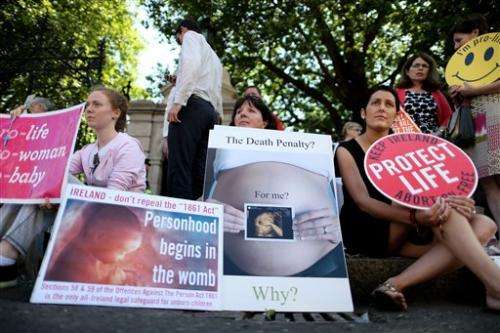Anti-abortion campaigners wait outside the Irish Parliament at Leinster House, Dublin ahead of a parliamentary vote on abortion. Wednesday July 10, 2013. Irish politicians will vote Wednesday to pass divisive laws to legislate for the first time for abortion in limited circumstances. (AP Photo/ Julien Behal/PA) UNITED KINGDOM OUT
After decades of delay and months of argument, Ireland's lawmakers agonized Wednesday over government plans to pass an abortion bill for the first time in this predominantly Catholic country.
Prime Minister Enda Kenny acceded to lawmakers' demands for an extended round-the-clock debate of the bill, which would authorize abortions for medical emergencies.
His concession meant that the vote, long scheduled for Wednesday night, was pushed into the early hours of Thursday as lawmakers debated 165 potential amendments. The government rejected them all.
Outside more than 100 anti-abortion protesters, who had spent the night reciting prayers with rosary beads beside the entrance to the Parliament building, vowed to spend a second night kneeling on the spot in hopes of inspiring lawmakers to rebel against Kenny. "Keep abortion illegal—babies can LIVE without it," their placards read.
But Kenny enjoys the largest parliamentary majority in Irish history, so the bill's passage appeared certain. The bill already received overwhelming backing in an initial vote last week.
While Ireland officially outlaws abortion in all circumstances, its laws on the matter have been muddled since 1992, when the Supreme Court ruled that abortion should be legal in cases where doctors deem a woman's life at risk from continued pregnancy—including, most controversially, from her own threats to commit suicide if denied one.
Six previous governments refused to back the judgment, citing the suicide grounds as open to abuse by abortion-seekers. But Ireland faced renewed pressure to pass legislation on medical-emergency abortions after the European Court of Human Rights ruled in 2011 that Ireland's inaction meant that pregnant women in medical crises faced potentially dangerous delays in receiving terminations in neighboring England, where abortion was legalized in 1967.
Still, Kenny's government didn't draft its abortion bill until after the legal limbo was widely blamed for killing a woman in an Irish hospital last year. In that case, a woman 17 weeks pregnant with her first child was diagnosed with a miscarriage, but doctors refused her pleas for an abortion and said they couldn't act until the fetal heartbeat stopped. The delay contributed to her contraction of fatal blood poisoning.
The bill proposes that one doctor's opinion is sufficient for a woman in an immediate emergency to receive an abortion; a woman facing life-threatening complications would need two doctors' support for an abortion; and a suicidal woman would need her threats to be verified as credible by three doctors—including two psychiatrists—for an abortion to be permitted.
Kenny's traditionally conservative party, Fine Gael, does face a damaging split, with at least five of his lawmakers most ardently opposed to abortion poised to vote against it—a rebellion that Kenny has promised to punish by barring them from re-election.
One of the Fine Gael rebels, Peter Mathews, said the bill if passed would put Ireland on to a slippery slope toward easy access abortion.
"That is a shocking reality: the gift of life being snuffed out," Mathews said. "Wars and famines come and go, but abortion stays with a society and eats at its heart."
But left-wing lawmakers who want wider access to abortion denounced the bill as weak-willed and cowardly. They all intended to support the bill as a small first step toward achieving their goal. That side of the house includes Kenny's coalition partners in the Labour Party and dozens of opposition lawmakers, including from the Irish nationalist Sinn Fein party.
© 2013 The Associated Press. All rights reserved.






















